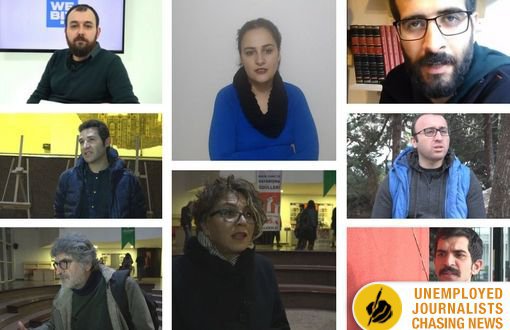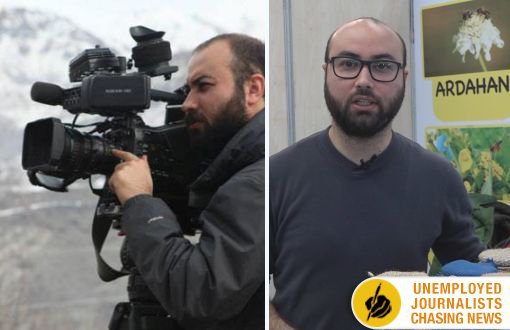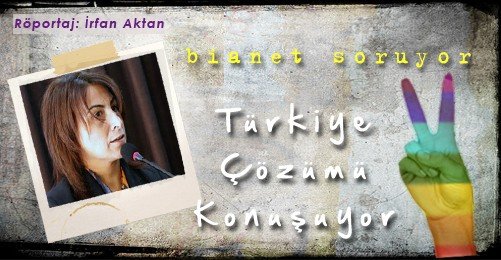Click to read the article in Turkish / Kurdish
When this time of crackdowns ends, researchers will indeed do media monitoring to see the picture of these days. Books will be written, documentaries will be shot, eyewitnesses will be heard. The main reference guide of the researchers will be the incidents that were or were not reported in the written and visual media. Live footage of TV stations raided by police, “free press will not remain silent” slogans echoing in courthouse corridors, unjust sufferings of discharged journalists who spend their lives for their occupation, journalists’ pleas in courts, absurd charges pressed against them will be the subjects of documentaries and researches.
Social objection that started in 2013 with the Gezi protests against the AKP government has been followed by policies of minacious crackdowns, censorship and auto-censor against the press. “Elimination” efforts firstly run through the bosses were actualized by mass discharges through statutory decrees or trustee appointments to media outlets in 2016.
As some of the journalists who were left unemployed try to continue their job by forming new mediums, some others of unknown number had to go on exile due to government’s crackdown. The remaining large majority that corresponds to some 10,000 people seem to be decoupled from their profession at least for now.
As the great part of the discharged journalists don’t seek a job anymore, a few number of journalists try to sustain their lives in different line of works but they all expect the political crackdowns to come to an end and to return to their job.
Left-wing, Kurdish or members of the Fethullah Gülen movement. Some of them are still unemployed, some work as carpenters, some opened up shops, some are preparing to open cafes and some are inaccessible. The Chairman of Journalists Union of Turkey evaluates.
Serpil Savumlu, journalist for 15 years, is unemployed now. Indeed, she was employed until recently. However, she had to close down the dry fruits and nuts shop she had opened up in her hometown of Bandırma. She is currently looking for a job.
Gökhan Kazbek, journalist for 27 years. Fortunately he has a job now: Carpentry.
Semra Pelek, journalist for 18 years. She was fired from Milliyet newspaper through an “order from above,” one year before Savumlu and Kazbek. After a year of unemployment, she finally found a job as copywriter at a public relations company nine months ago.
Denizcan Abay, journalist for four years. He has been unemployed since October 4, 2016. On the same day, his mother was fired as the radio she had worked for was shut down. His journalist father has refugee status in Germany due to the prison sentence he received. If Denizcan Abay’s dream to open a cafe comes true, he will have a new job.
İhsan Çağrı Boyacı started journalism a few years ago. He had a job until recently. He was working as a waiter at a bar in Ankara. Yet when he could not get along with his boss, he needed to quit. Now he is looking for a job.
Ahmet Gülmez founded his own workplace. His bookshop is doing fine for the time being
Cameraperson Dedeoğlu
When an event takes place, camerapeople scuffle to get the best shot. From time to time, there are struggles that end in fights. Turgut Dedeoğlu, a cameraman for 31 years, is called “grandpa” by his colleagues and is certainly respected among them.
When the camerapeople scuffle at social events, “grandpa” is always given the best spot. More precisely, he used to be given the best spot Although he retired in 2011, he was kept working in order to provide for his children in university until very recently.
He is unemployed since October 2016, and no position in media is given to this master cameraperson.
Serpil Sevumlu: From anchorwoman to tradeswoman
Serpil Savumlu, a journalist for 15 years, worked most recently for İMC TV. Her tradeswoman journey is familiar: A little dry fruits and nuts shop in Bandırma thatdoes not do much business. Having begun journalism in 2012 at Evrensel newspaper, Savumlu worked at their Ankara bureau for two years and then went on to become a correspondent at state security court in İstanbul.
Later, she was an anchorwoman for the night news in Hayat TV until 2009. In 2012, she transferred to İMC TV. She was both an editor and the presenter of “Purple Bulletin,” the women news program of the channel: “My résumé only consisted of journalism. But now there is tradesmanship. Of course it did not last long.”
İMC TV was among the 12 TV and 11 radio channels that were shut down following the Statutory Decree no 668. A few days after the decree, on October 4th, İMC TV was raided by the police.
While İMC broadcasted the police raid live, employees protested the raid. Hayatın Sesi TV, Denge TV, Jiyan TV, Zarok TV and Van TV, also listed on the decree, were all shut down one by one.
Savumlu learnt about the raid when she was next to her mother-in-law’s deathbed.
“I was in the hospital while there were the rumors circulating that the station was going to be shut down and that the police were about to arrive. On one side there was the closing down of the channel, on the other there was the death of my mother-in-law... One after another. Afterwards, I did not even have the strength to look for a job. As a matter of fact, I did not have the hope to find one. All the places I could have worked for were shut down. Then I had to go back to my hometown of Bandırma.
Here I opened a shop where I sell natural products. But I don’t have a good grasp of trademanship. Of course I wasn’t the only source of the problem. Even when people buy chickpeas, they buy them in grams. There is a ghastly poverty. In addition, there is a ghastly racism. Bandırma is a little place.
People learnt that I was working for İMC TV until recently and that the channel was closed through Statutory Decree. They also learnt that I am married to a Kurd. My son’s name is Deniz Jiyan but here I had to call him Deniz. With all these things, I couldn’t continue with the shop and I closed it.”
Gökhan Kazbek: From editorship to carpentry
This time we go to a carpentry atelier in Istanbul Okmeydanı. Here works a journalist with 27 years of experience.
Gökhan Kazbek started journalism in 1989 at Sabah newspaper. He worked for Hürriyet, Turkish News, Star TV, Kanal 6, Ata TV and TRT. He was fired from TRT in October 2013 due to his tweets following the Gezi protests.
Like all the other journalists who were fired after Gezi with the direct or indirect involvement of the government, Kazbek was not provided with a position in the mainstream media.
After one and a half years of unemployment, he finally started working as an editor for İMC TV. This was his last experience as a journalist before beginning carpentry. Some of his job applications were turned down.
Some of them were not even answered. When he was convinced that there is no space for him to do journalism, Kazbek entered the carpentry business with Mevlüt Aydoğan, who was a cameraperson for him.
After he was sacked from TRT following the Gezi protests, Aydoğan worked for Ulusal Kanal for a while. When he was not paid for nine months, he quit and found a job at Cihan News Agency. He once again became unemployed after the agency was closed due to the first Statutory Decree after July 15th.
Kazbek tells about the aftermath:
“Mevlüt has improved his skills in carpentry above the level of a hobby. When İMC was closed, we met again and decided to start this job. I am on both the production and marketing sides of the business.
He is only on the production side. We have another friend who is a carpenter by trade. From time to time we consult him. We have our atelier. We are skilled enough to do anything, from tables to bedroom furniture.”
Even though they have skills, the money they make with carpentry is not enough to pay rent, let alone provide for their children at university.
Kabek says “when İMC was shut down, we were like fish out of water”. One night four friends of his, who were also unemployed journalists, asked him to come to a cafe in Kadıköy.
When he got there, Kazbek learned that his friends were trying to earn money by conducting beer tasting for customers:
“They were all journalists... One friend had gotten into e-commerce, trying to sell women’s clothing. Some friends even found regular jobs. Yet there are many friends who could not yet find any job.
I saw the state of emergency period in the 1990s as a journalist. But I have never seen a period like this before. I am 51 years old and have worked this job for 27 years. My present condition is a zero. I don’t have a house or car. I have nothing.”
Semra Pelek: Your names came from above
It is said that many journalists who were unemployed following the coup d’etat of 1980 went into the ad-writing business. Semra Pelek, who was working as a politics editor in Milliyet and was sacked in August 2015 with 10 fellow journalists, went into a similar job. Of course, this was after a year of unemployment.
It was not easy to switch to another job. Yet Pelek feels lucky when she looks at the condition of her friends: “I was doing journalism with love and passion, But I am not sure whether I have warmed up to this new job as much. I entered Istanbul University’s Communication Faculty in 1996. Starting from my second year, I started to work as a correspondent for Milliyet newspaper. I worked as the correspondent at the state security court. Then I worked at other places. Then I went back to Milliyet. After the elections of June 2015, there was collective layoff at Milliyet in September 2015. They said to us that our names came from above. But we don’t know where “above” is.”
What’s more, on what grounds are those “above” making these lists?. Pelek replies:
“In addition to AKP’s political intervention for the last 10-15 years, there has been a transformation in media that dates back to the 1990s. Back then, they were sacking experienced journalists and hiring younger ones who they can employ for cheaper. Especially after June 2015, they went on to leave no critical voices in newspapers. No environment was left in mainstream media in which principled journalism could be conducted. Newspapers are asked to take sides for them.
This is against the essence of journalism. At Milliyet, there was no direct pressure on me to take sides. But as I was the politics editor, there was a lot of pressure. The number of questions like “why did you use this at this size” or “why did you use that heading” increased. Even putting the opposition party in a headline in 15 centimeters was a problem. This makes one question journalism after a while.
When you try to give space on page to a piece of news worthy of its value, there are other dynamics interfering. It starts to contradict with the values you believe in and to which you were working accordingly. And you become unable to work. For this reason, I didn’t even apply to a job after Milliyet. In alternative media on the other hand, economic problems make employment impossible.
Denizcan Abay: Family of unemployed journalists
Denizcan Abay has experienced the oppression suffered by journalists in Turkey through the penalties received by her father, Necati Abay. The elder Abay took refuge in Germany in 2012, after receiving a prison sentence for reporting he had done.
When she was in high school, Denizcan Abay started to help her father, spokesperson for the Platform for Solidarity with Arrested Journalists, to keep tally of the journalists in jail. For this reason, she closely observed the price of critical journalism back then.
After she graduated from the faculty of communication, she started to work at Özgür Radyo, carrying on her father and mother’s occuption. Her second and final job was at İMC TV. On October 4, Özgür Radyo was closed along with İMC and her mother Leyla Abay, director of the radio, was taken into custody.
Abay tells about the aftermath:
“My father was also taken into custody and arrested at Atılım newspaper in 2013. He was under arrest for six months, while the cases were proceeding. At this time he was the spokesperson for the Platform for Solidarity with Arrested Journalists. I passed my high school years helping my father list the names of the imprisoned journalists.”
The present situation for the Abay family is this: The mother is unemployed, the father is a refugee, and Denizcan dreams to open a cafe after four years of journalism. In her own words: “it is still in the stage of intention”. But her real intention is to return to journalism as soon as “the state of things change.”
Faruk Balıkçı: When the door was closed, we entered from the chimney
Journalists reacted to the closing down of Diyarbakır-based media organizations Azadi TV, Jiyan TV, Zarok TV, Gün TV and Dicle Haber Ajansı through the Statutory Decree no 668 issued on September 29, 2016, with a three-day sit-in protest.
Faruk Balıkçı, who participated inthe sit-in protest, says: “We, over 70 journalists only from Diyarbakır, were fired in one night.”
“I was working for İMC TV. To be honest I haven’t made a legal application. Neither did I get a compensation. At first, we wanted to carry out our sit-in protests with a hunger strike. But then it was generally agreed that this might have been inconsequential. For that matter we renounced this idea.
Most of those who were fired are still unemployed. Many of them are looking for jobs in different areas. I personally found a job in the news site Özgürüz. But when you have so many unemployed friends, you don’t feel like doing journalism. I can’t say that we are doing our job as willingly as before. But in the end, they closed the door on us, but we entered from the chimney. There are numerous friends who could not enter from the chimney.”
Employees who worked for media organizations close to the Fetullah Gülen movement and were fired form an important portion of the journalists who were sacked due to political oppression. According to press organizations, this number is somewhere in between 2,500 and 3,000.
These closures were justified in the statutory decrees as “belonging, coherence? or connection to Gulenist Terror Organization (FETÖ), which was decided to pose threat to national security; terrorist organizations; or structures, formations or groups which are decided to function against the national security of the state by the National Security Council”.
Yet those who became unemployed following the closing of Gülen Movement media outlets do not want to talk to anybody out of fear of being associated with putschists. Journalists from Gülen Movement media that we could reach hid their past. Such that, without exception, they All rejected giving us an anonymous interview.
This can be explained by the fact that 30 journalists and employees of Zaman newspaper, 21 of which are arrested, are facing three life sentences for “attempts to orchestrate a coup” and up to 15 years of imprisonment for “being a member of a terrorist organization.
They do not talk
For example, a journalist who had worked for Bugün newspaper for years cancelled our appointment at the last minute due to a job offer he received. He said “I am sorry, but I found two journalist women who will speak to you”. Later, he told us that those two women also did not want to talk.
One did not want to talk because she had started to sell jewelry online and she was scared to lose this job to which she has given everything she has.
A former correspondent, who now works as a laborer in a factory , did not approach the interview since he did not want to lose his job. Another possible interviewee, a cameraperson, refused our demand to meet by saying, “We have had a run of bad luck. We were just barely not imprisoned Let’s not get into these things”.
A journalist who had lost his job while working in Gülen Movement Media says: “When I was among them I was like a zombie as I don’t have anything to do with religion. Yet now I am forced to prove that I am not a member of FETÖ.”
As there is a possibility that he might find a job, he also does not want to talk to us.
Where are the journalists in Gülen Movement media?
Gökhan Durmuş, Chairman of the Journalists Union of Turkey (TGS), says that following the operations towards Gülen Movement media, they could not even reach out to those who are members of the union.
“There are approximately two thousand unemployed journalists who were fired through the operations against Gülen Movement media. These people hide themselves as they are scared to be accused of membership in the movement. This is quite clear. The majority of them have nothing to do with it. They were working there for their bread and butter.
But they think that they will be accused if they go and make a declaration about this. There are already 80 journalists who are arrested due to membership to FETÖ. That’s why they are more timid. That’s the reason why they are not in the market, looking for jobs.
I know at least that they are not looking for jobs in the media sector. Three thousand people who used to work in places that were shut down through the decrees are unemployed now. Their possible employers are not hiring new people. Instead, they are drawing down their workforce. There are dismissals in these places. Often, three or five people are sacked from big media companies. Hence, even if dismissed journalists were to look for a job, there is no place they can find one.”
Durmuş, Chairman of TGS, says that while they know the areas that unemployed journalists from left-wing and Kurdish media gravitate towards, there is no information regarding the majority of those once employed in Gülen Movement media. (İA-EG/NU/HK)
UNEMPLOYED JOURNALİSTS CHASİNG NEWS
1- Even Though They Speak Through Their New “Occupations,” They Are Journalists
2- Journalism is Banned under theState of Emergency
3- Germany: New Generation Diaspora/Kopuntu
4- Germany: Immigration of the Suffocated
5- The Organization that Made "The Arab Girl Looks from the Window"
6- How They Work/Cannot Work, Breaking Down the Stereotypes
7- They Marry White People to Avoid Discrimination
8- Private Rehabilitation Centers and Problems: The Example of Bingöl
9- Two Directors Discuss the “Educational Support for People with Disabilities” Practices
10- 'Solution is Inclusion System in Education for People with Disabilities'
11- Students and Parents from Bingöl Tell of Their Experiences
* The "Unemployed Journalists Chasing News" project is being realized with the financial support of Matra-Human Rights Program of Consulate General of the Kingdom of the Netherlands.









